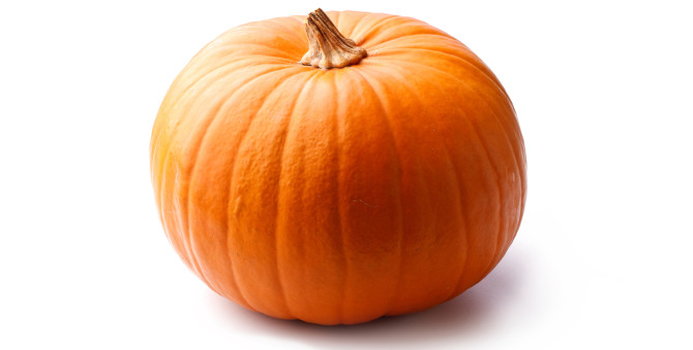Pumpkin squash is a fruit that belongs to the gourd family. The fruit has a round shape but appears to be flattened at the top and bottom. It may also have an oblong shape. The weight of the fruit ranges from 1 pound to several hundred pounds. Smaller pumpkins known as the sugar or pie pumpkin are the sweetest. The pumpkin has a thick outer shell that is orange or deep yellow in color. However, some varieties may be green, red or gray in color. The interior has a deep orange color. Plenty of edible seeds known as pepitas are found inside the fruit. It has high amounts of vitamins A and C. It also contains vitamins B1, B3, B5 and B6. Mineral content includes potassium, magnesium, iron, calcium, copper and phosphorous. The fruit can also help you meet your dietary fiber requirements. Below are some of the health benefits of pumpkin squash.
Vitamin A (Beta-Carotene)
The fruit contains some of the highest amounts of beta-carotene which the body converts into vitamin A. This vitamin has both antioxidant and anti-inflammatory effects. Research has established that vitamin A promotes the health of lungs and reduces the risk of lung cancer. It also helps to prevent emphysema which stems from cigarette smoking or pollutants in the workplace and environment. Emphysema hinders respiratory functions and causes breathlessness. Vitamin A can help to prevent the oxidation of cholesterol in the body. Oxidized cholesterol accumulates in blood vessels and forms plaque which increases the risk of stroke and heart disease. Regular consumption of pumpkin can improve your cardiovascular health. The anti-inflammatory properties of the fruit can also help to reduce severity of symptoms if you suffer from asthma or arthritis.
B Vitamins
Folate (vitamin B9) in pumpkin can support your health in various ways. It helps to break down homocysteine, which is a dangerous by-product of metabolism. Homocysteine has the capacity to damage blood vessel walls which increases the risk of heart attack. Plenty of folate in the diet can help lower homcysteine levels and support the health of your heart. Folate has also been found helpful in protecting colon cells. Pumpkin is a good item in the diet if you want to reduce the risk of colon cancer.
Vitamin C
The fruit has a powerful antioxidant capacity due to the high content of vitamin C. This helps to boost your immunity. Common infections such as earache, sore throat, colds and the flu needn't trouble you as much when pumpkin is regularly included in the diet.
Potassium
Regular intake of pumpkin can help to stabilize your blood pressure. The fruit is a good source of potassium which helps to lower blood pressure. This is a boost to cardiovascular health.
Dietary Fiber
It has been shown that fiber can help fight certain cancers. Fiber accelerates food transit through the gut. Colon cells are therefore exposed to carcinogens for a shorter while. The fiber also helps to eliminate carcinogens from the body. Regular intake of pumpkin can help lower your risk of colon cancer.



